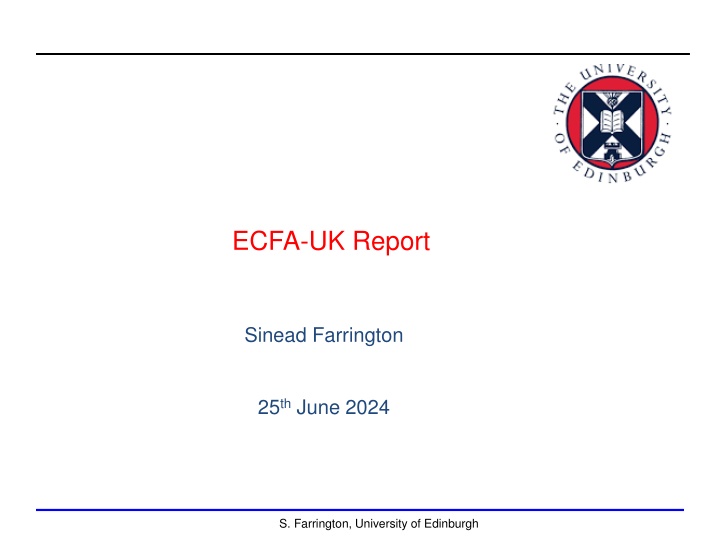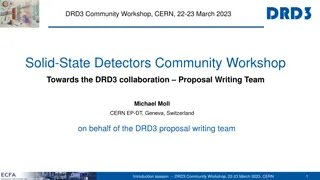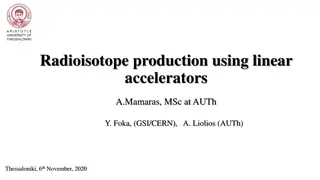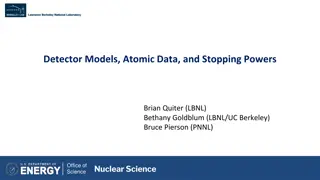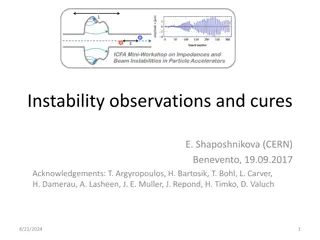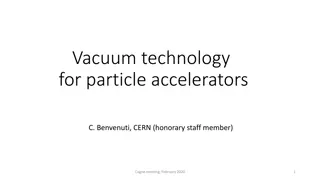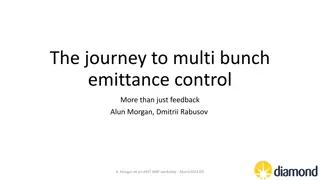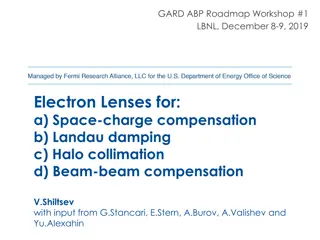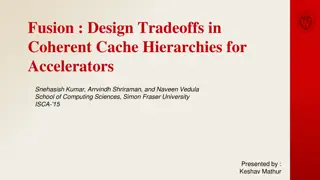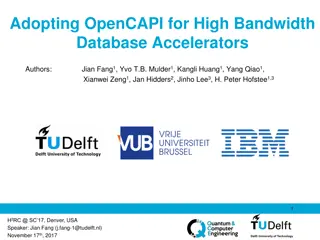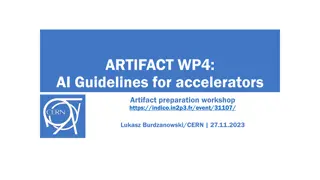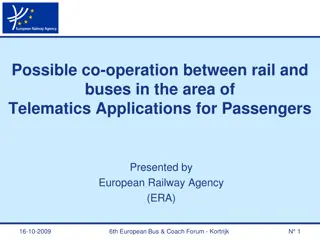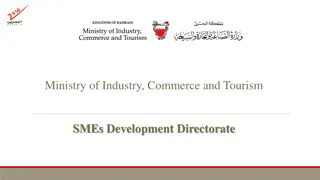Overview of ECFA-UK: European Committee for Future Accelerators and its Activities
ECFA-UK, the European Committee for Future Accelerators, consists of members from prestigious institutions in the UK like Oxford, Edinburgh, Bristol, RAL, Glasgow, Cambridge, and UCL. The committee's main objective is to assess and ensure the well-being of the particle physics field in Europe and enact the European strategy. It oversees initiatives such as the European Detector Roadmap and the e+e- Higgs Factory study group. ECFA holds regular plenary and restricted meetings, reviews particle physics in multiple countries annually, and collaborates with nuclear and astroparticle physics entities.
Download Presentation

Please find below an Image/Link to download the presentation.
The content on the website is provided AS IS for your information and personal use only. It may not be sold, licensed, or shared on other websites without obtaining consent from the author.If you encounter any issues during the download, it is possible that the publisher has removed the file from their server.
You are allowed to download the files provided on this website for personal or commercial use, subject to the condition that they are used lawfully. All files are the property of their respective owners.
The content on the website is provided AS IS for your information and personal use only. It may not be sold, licensed, or shared on other websites without obtaining consent from the author.
E N D
Presentation Transcript
ECFA-UK Report Sinead Farrington 25th June 2024 S. Farrington, University of Edinburgh
Who are the UK members of ECFA? ECFA: European Committee for Future Accelerators UK members: term: 3+3 years Daniela Bortoletto (Oxford) - Restricted ECFA member for the UK Sinead Farrington* (Edinburgh) Joel Goldstein (Bristol) Haroon Rafique (RAL) Aidan Robson (Glasgow) Sarah Williams (Cambridge) Matthew Wing (UCL) Lab directors (AsTeC - Jim Clarke and PPD - SF soon) plenary members ECR members (see next talk): term 2+2 years Julia Allen* Patrick Dougan Atanu Modak* Holly Pacey* *upcoming vacancies later this year Nominations are solicited via the STFC committee call S. Farrington, University of Edinburgh
What does ECFA do (internationally) ECFA: European Committee for Future Accelerators Assess and assure the health of the particle physics field in Europe, to assure the future of the field Assure that the previous European strategy is enacted S. Farrington, University of Edinburgh
What does ECFA do (internationally) European Detector Roadmap has been written by an ECFA group chaired by Phil Allport This has spawned the Detector R&D collaborations (see Chris Parkes talk) (the accelerator European roadmap has been written by the Lab Directors Group chaired by Dave Newbold) S. Farrington, University of Edinburgh
What does ECFA do (internationally) ECFA e+e- Higgs Factory study group (chairs Aidan Robson and Christos Leonidopoulos) Bringing together all e+e- accelerator collaborations into one physics (including detector) study group Previous meetings at DESY, in Paestum, next one in Paris in October https://indico.in2p3.fr/event/32629/ S. Farrington, University of Edinburgh
What does ECFA do (internationally) Plenary ECFA meets twice a year Next meeting next week in Frascati, report from UK labs as one of the regular lab reports Restricted ECFA meets around 4 times a year The decision-making body of ECFA Reviews particle physics in ~4 countries a year, writes a report with recommendations for the country Joint meetings with nuclear and astroparticle physics, next one to be held in the UK in 2025 JENAS (Joint ECFA, Nuclear physics European Collaboration Committee, Astroparticle Physics European Consortium) S. Farrington, University of Edinburgh
What does ECFA do (in the UK) Attend meetings, appointed as individuals but also representing the country Organising RECFA visit to the UK this September Following the prescribed format for the visit To be held at the Royal Society Speakers have been invited S. Farrington, University of Edinburgh
What does ECFA do (in the UK) European Strategy Particle Physics Update: Workshop at IPPP, Durham in September organised by ECFA-UK https://conference.ippp.dur.ac.uk/event/1357/ please register! Organised by ECFA-UK and IPPP, Durham Bring the community together for a physics (rather than strategic) focused workshop Discuss the major physics goals of the next decades of particle physics and encourage UK contributions to analysis studies which can be submitted to the strategy process, either as individual studies, or as submissions by already-established consortia, or as inputs to the ECFA e+e- study (as an example). Provide talks on opportunities and challenges in detector R&D and accelerator physics. Workshop is open to all, with participation across all particle physics scientific interests - theorists and experimentalists - and across the community demographic. It is not intended to discuss preferences for facilities at this meeting, rather to inform the next steps in our national discussion. S. Farrington, University of Edinburgh
What does ECFA do (in the UK) European Strategy Particle Physics Update: Workshop at IPPP, Durham in September organised by ECFA-UK If you have topics to contribute please contact the session chairs (in each case the last one is the ECFA-UK member helping with that area): Detector R&D: Chris Parkes, Daniela Bortoletto Accelerator R&D: Phil Burrows, Jim Clarke, Stewart Boogert, Matthew Wing, Haroon Rafique Theory cross-cutting the below areas: Michael Spannowsky, Sinead Farrington e+e-: Guy Wilkinson, Aidan Robson eh: Uta Klein, Matthew Wing 10 TeV pCM colliders: Andy Pilkington, Karol Krizka and Sarah Williams HL-LHC: Jon Butterworth, Sinead Farrington, Daniela Bortoletto Neutrinos: Kirsty Duffy, Sarah Williams Direct Dark Matter: Sally Shaw, Sarah Williams Non-collider experiments: Carl Gwilliam, Mark Lancaster, Sarah Williams Quantum technologies: Ian Shipsey, Sarah Williams S. Farrington, University of Edinburgh
Drafting Day October, date to be advised: UK national EPPSU submission Drafting Day: here the work begins on a community-wide draft. Try to converge around UK positions on some key questions. We may have a set of questions by then for national inputs to the European Strategy Update. This drafting day will aim to write down, from day one, statements that the UK community can agree on for submission. Later drafting days will iterate on this - the suggestion is 1-2 further drafting days before the deadline in March 2025. The editors will be drawn from ECFA-UK and co-opted PPAP members, to provide expertise across the full range of areas. S. Farrington, University of Edinburgh
ESPPU Context Formulating Europe's strategy for particle physics Five stages: 1. Community provides input by 31/3/25 2. Physics Preparatory Group (PPG) produces a Briefing Book 3. Open community meeting, June/July 2025 4. European Strategy Group (ESG) meets to draft the text; expected UK ESG members: Mark Lancaster (Manchester, UK CERN Council Scientific Delegate) Jim Clarke (AsTeC), Sinead Farrington (RAL-PPD) UK national lab representatives 5. Proposal goes to CERN Council, late 2025/ early 2026. This is all coordinated by the Strategy Secretary, appointed last week by CERN Council: Karl Jakobs. Now that he is in place, details on processes/procedures will follow. S. Farrington, University of Edinburgh
